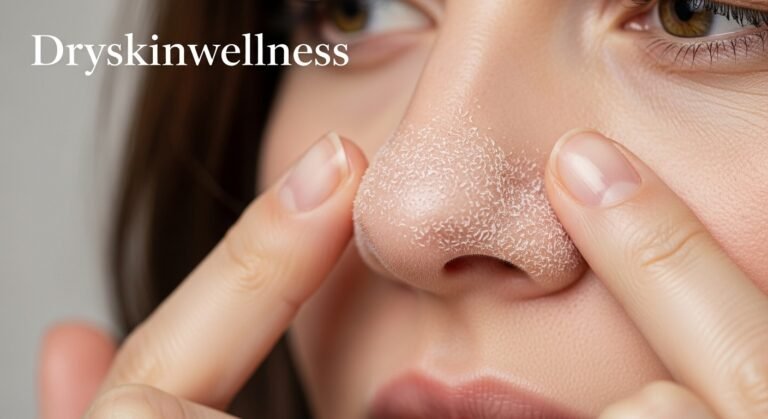Debunking The Myth | Is Dry Skin A Sign Of Dehydration?

Is dry skin a sign of dehydration? That’s a common assumption. However, many other factors can cause and contribute to dry skin. Understanding the causes of dehydrated skin can help you identify how best to protect it from further damage.
Signs of dehydrated skin, face
- Tightness in the skin
- Flaking or scaling
- Dullness and overall lack of luster to the complexion
- Fine lines appear around the mouth, eyes, and forehead.
- Irritation and redness on the surface of the skin
- Excessive oiliness in certain areas (this can indicate dehydrated skin as it is your body’s response to the lack of moisture)
Most often, dry skin is caused by environmental factors such as excessive exposure to wind and cold temperatures, which can strip the skin of its natural oils.
Other causes include
- Frequent and prolonged hot showers or baths.
- Harsh soaps or cleansers.
- Lack of proper hydration from water.
In most cases, dry skin can be treated and prevented by using moisturizers daily.
However, if you are experiencing persistent dry skin, it could be caused by more serious medical conditions such as eczema or psoriasis. In these cases, you should consult your physician for advice.
Organic Products
Consider using natural or organic products to help nourish and moisturize your body while protecting it from further damage. Natural ingredients like avocado oil, jojoba oil, and shea butter are all excellent options for providing your skin with the hydration and protection it needs without harsh chemicals or frag.
Causes of Dehydrated skin
Aside from dehydration, there are several possible Causes of Dehydrated skin
, such as environmental factors, hormonal changes, and genetics.
Environmental Factors
The environment can play a significant role in the health of your skin. Exposure to cold weather and dry air can cause skin to become dehydrated due to lack of moisture. Similarly, harsh soaps and detergents that contain chemical irritants such as sulfuric acid or lanolin can strip natural oils away from the skin, resulting in dryness.
Hormonal Changes
Changes in hormone levels can also lead to dry skin. The natural aging process, pregnancy, menopause, or certain medications such as birth control pills often cause these changes. When hormones fluctuate, they may cause your sebaceous glands to produce less oil, resulting in dryness.
Genetics
Some people are more prone to dry skin due to their genetic makeup. People with fair skin can be especially vulnerable as they have less melanin—the pigment that protects from the sun—which makes them more likely to suffer from dryness and flaking.
How to treat dehydrated skin?
Treating dehydrated skin often requires lifestyle changes, medications, and moisturizers. Here are some tips for managing dry skin:
- Drink plenty of water to stay hydrated and help keep your skin healthy.
- Avoid harsh soaps or detergents that contain chemical irritants.
- Limit time spent in hot, dry weather or air-conditioned rooms.
- Wear protective clothing such as long sleeves and hats when outside to shield your skin from the sun.
- Apply hydrating creams and moisturizers regularly throughout the day.
- If deficient in this vital nutrient for healthy skin, take a vitamin D supplement.
- If necessary, consult your doctor for prescription medications that can help alleviate dry skin.
It can sometimes be difficult to distinguish between dry and dehydrated skin. A lack of oil causes dry skin, while dehydrated skin is caused by an imbalance of water and oil in the skin. To determine your condition, it is essential to consider environmental conditions, lifestyle habits, genetics, and overall health. Consulting a dermatologist can also provide helpful advice for diagnosing and treating your skin condition.
It is important to remember that there can be many causes of dehydrated skin and that the best way to prevent it is by taking good care of your skin daily. This means using mild cleansers and moisturizers, protecting your skin from harsh environmental factors such as wind or cold, and drinking plenty of water to keep your body hydrated. Following these simple steps can help ensure your skin remains healthy and vibrant for years.
FAQs
Can dehydration cause dry skin?
Dehydration can effectively contribute to dry skin but is not the only cause. It is essential to identify the underlying causes of your condition and take steps to protect your skin from further damage. With proper care, you can keep your skin healthy and hydrated.
What are the five signs of dehydration?
1. Dark yellow or orange-tinted urine
2. Feeling thirsty
3. Fatigue
4. Dry mouth and skin
5. Headache
What is your dry skin telling you?
Dry skin can be a sign that something is off in your body. Hormonal changes, environmental factors, or genetics could cause it. Paying close attention to your symptoms and tracking them over time can help you determine the cause and take steps to treat it.
Final Thought
Many factors, including environmental conditions, hormonal changes, and genetics, can cause dry skin. It is essential to recognize these potential causes to care for your skin and ensure it stays healthy properly.
Drinking plenty of water, avoiding harsh soaps and detergents, using sun protection outdoors, and moisturizing regularly are just a few ways to help keep your skin healthy and hydrated. By understanding the causes of dry skin, you can take proactive steps to protect it.




